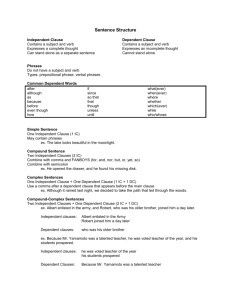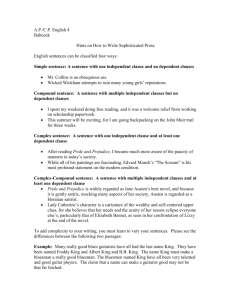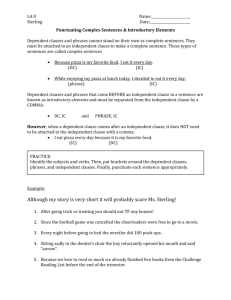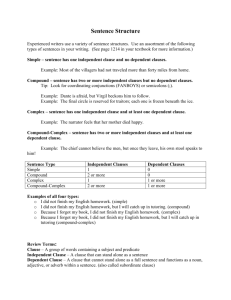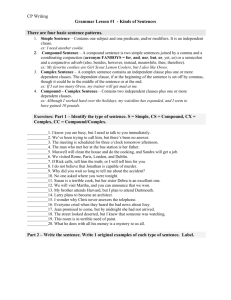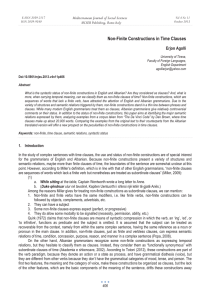swallowed <1
advertisement
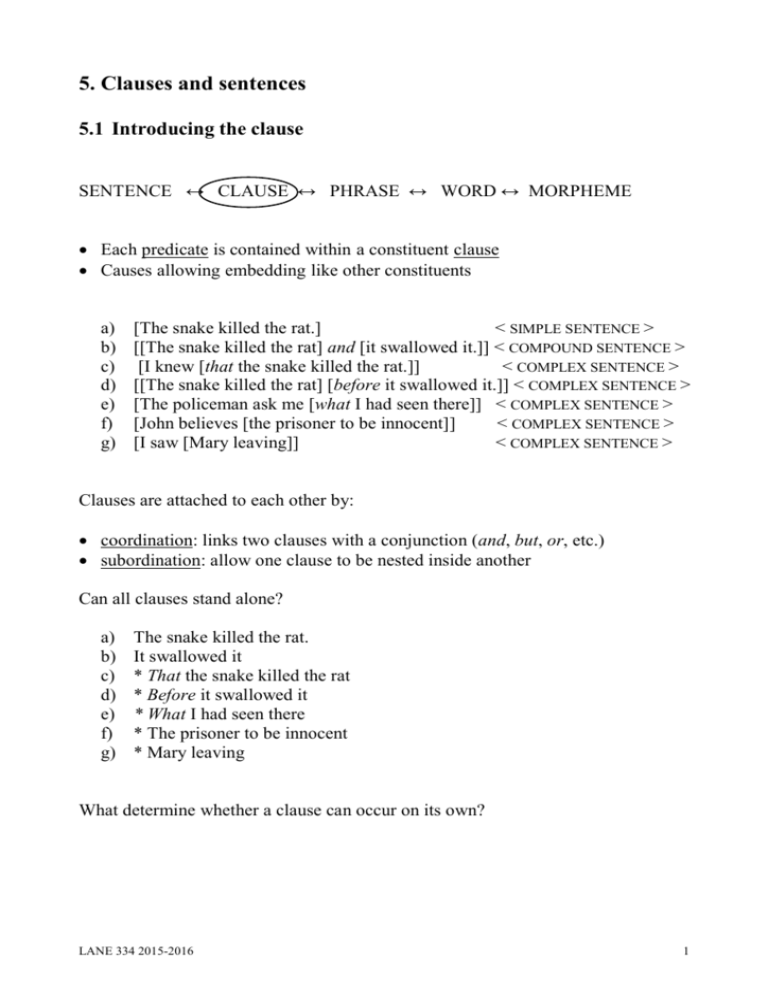
5. Clauses and sentences 5.1 Introducing the clause SENTENCE ↔ CLAUSE ↔ PHRASE ↔ WORD ↔ MORPHEME Each predicate is contained within a constituent clause Causes allowing embedding like other constituents a) b) c) d) e) f) g) [The snake killed the rat.] < SIMPLE SENTENCE > [[The snake killed the rat] and [it swallowed it.]] < COMPOUND SENTENCE > [I knew [that the snake killed the rat.]] < COMPLEX SENTENCE > [[The snake killed the rat] [before it swallowed it.]] < COMPLEX SENTENCE > [The policeman ask me [what I had seen there]] < COMPLEX SENTENCE > [John believes [the prisoner to be innocent]] < COMPLEX SENTENCE > [I saw [Mary leaving]] < COMPLEX SENTENCE > Clauses are attached to each other by: coordination: links two clauses with a conjunction (and, but, or, etc.) subordination: allow one clause to be nested inside another Can all clauses stand alone? a) b) c) d) e) f) g) The snake killed the rat. It swallowed it * That the snake killed the rat * Before it swallowed it * What I had seen there * The prisoner to be innocent * Mary leaving What determine whether a clause can occur on its own? LANE 334 2015-2016 1 5.2 Finite and non-finite verbs In English, there is a strong correlation between clauses which can occur on their own as main clauses and the finiteness of the verb… Finite verbs include the grammatical categories of tense, aspect and/or agreement… a) The snake killed the rat b) It swallowed it. c) John believes the prisoner to be innocent Non-finite verbs occur as infinitives or as participles with or without finite auxiliary verbs: a) [John believes [the prisoner to be innocent]] FINITE NON-FINITE b) [I saw [Mary leaving]] FINITE c) Sally is NON-FINITE walking along the beach FINITE NON-FINITE d) Sally has finished this book FINITE NON-FINITE Non-finite verbs cannot usually occur as main verbs in main clauses: a) * The prisoner to be innocent b) * Mary leaving Are the following clauses finite? a) * That the snake killed the rat b) * Before it swallowed it c) * What I had seen there LANE 334 2015-2016 2 5.3 Compound sentences: clause coordination Two main clauses may join together to form a compound sentence: a) [George cheated at Harvard] and [Jane cheated at Yale.] b) [John studied very hard last year] but he failed his test.] c) [Paul will go to the cinema tonight], or [he will stay at home to read a book.] coordination: [S1 [S2] coord [S3]] S1 S2 coord S3 and George cheated at Harvard Jane cheated at Yale 5.4 Complex sentences: Subordination 5.4.1 Non-finite subordination Embedding a subordinate clause inside the main clause form a complex sentence. The subordinate clause may be non-finite embedded inside the finite clause. The non-finite clause may appear as a complement: a) [S1John believes [S2the prisoner to be innocent]] b) [S1I saw [S2Mary leaving]] S1 NP VP N V I saw S Mary leaving subordination: [S1 [S2 ]] LANE 334 2015-2016 3 The non-finite clause may also appear as an adjunct: a) [While carrying the baby], [I fell down] b) [The cat [laying on the doorstep] is asleep] 5.4.2 Finite subordination Subordinate clause may also be finite, either: introduced by a complementiser (COMP); as a relative clause Complementizers and finite subordination The embedded clause may be headed by COMP (that, whether, if, for, before, because, since, etc.) The embedded clause headed by COMP is labeled CP a) [S1 I know [CPthat [S2the snake killed the rat.]] b) [S1 He asked [CPwhether [S2he might go home with her.]] c) [S1 He asked [CPif [S2he can accompany his mother.]] d) [S1 The coroner asked [CPwhy [S2the witness had measured the distance]] e) [S1 The policeman asked me [CPwhat [S2I have seen there]] S NP VP N V I know CP COMP S that the snake killed the rat LANE 334 2015-2016 4 subordination: [S1 [CP ]] CP→ COMP S 5.4.3 Relative clauses Relative clauses modify nouns but realized by a clause (CP). Relative clauses may relativise on the subject, object, indirect object, and may be adverbial, leaving a gap in the clause. a) [NPThe man [CPwho [S ___ met Mary]]] looks scary b) [NPThe man [CPwho [SMary met___]]] looks scary c) [NPThe man [CPthat [SMary met___]]] looks scary d) [NPThe man [CPwho(m) [SI sent the book to ___]]] looks scary e) [NPThe man [CP to whom [SI sent the book ___]]] looks scary e) [NPThe place [CPwhere [Swe decided to meet___]]] was inconvenient Restrictive vs. non-restrictive relative clauses Relative clauses may also vary in their scoop interpretation: My sister, who lives in Britain, sent me a gift. >> entails 1 sister (non-respective) My sister who lives in Britain sent me a gift. >> entails more than one sister LANE 334 2015-2016 5 Deletion in Relative Clauses Relative pronoun functioning as an object of a verb or a preposition can be deleted whereas relative pronoun functioning as a subject cannot be deleted: a) The man Ø Mary met looks scary b) The man Ø I sent the book to looks scary c) * The man to Ø I sent the book looks scary d) * The man Ø met Mary looks scary 5.5 Compound-complex sentences: coordination + subordination Coordinating the subordinate clauses forms a compound-complex sentence: [I know [S'that [S2 [the snake killed the rat] and [(that it) swallowed it.]] [S1The snake [S'which [S2killed the rat] and [(which) swallowed it]] belongs to our neighbors] Reading for this lecture: Wekker&Haegeman (1985: 35-56; 116-124) LANE 334 2015-2016 6


